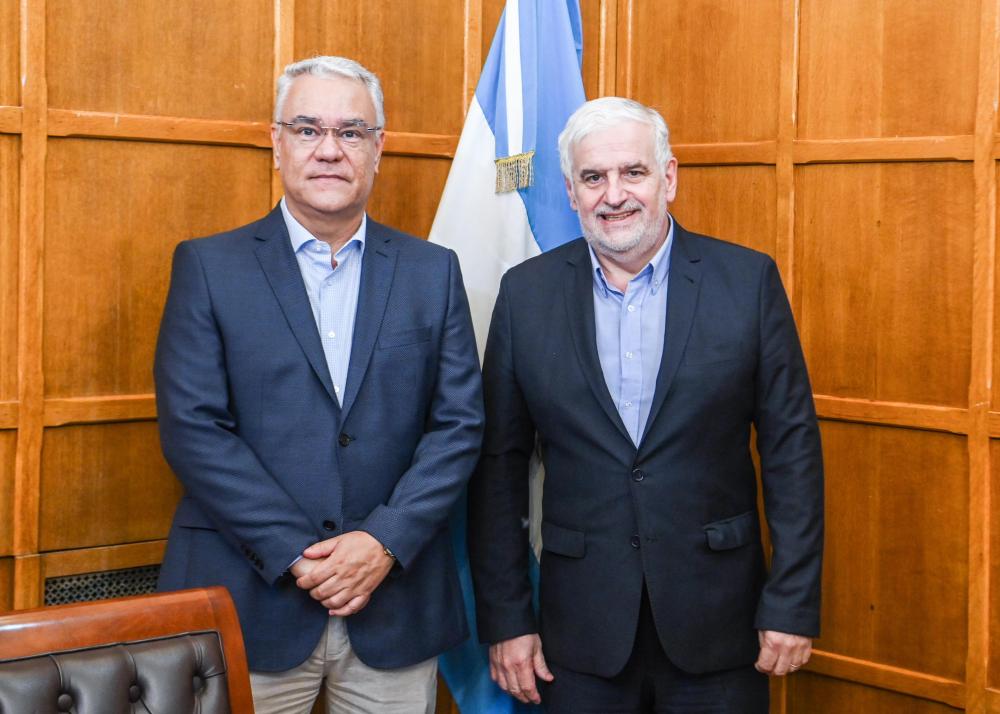IICA will cooperate with Argentina’s new Secretary of Agriculture to expand the bioeconomy’s contribution to economic development in harmony with the environment

Buenos Aires, 16 January 2024 (IICA) – The Inter-American Institute for Cooperation on Agriculture (IICA) and Argentina will collaborate on initiatives aimed at fostering the bioeconomy’s growth in that country, based on their shared conviction that it affords a valuable opportunity for development in harmony with the environment.
This was the agreement reached by Fernando Vilella, Argentina’s new Secretary of Agriculture, Livestock and Fisheries, and Fernando Camargo, IICA Representative in Argentina, during a meeting in Buenos Aires together with their work teams.
Vilella stated that one of the priorities of his term in office will be promoting the bioeconomy, which he defined as the use of biomass to generate products and inputs as part of a circular economy, while reducing the environmental and social impacts of production. In fact, he announced his intention to change the name of the secretariat he oversees to Secretariat of the Bioeconomy sometime in the future.
This mode of production is based on the comprehensive use of all plant and animal products, by-products and waste generated in rural areas, while placing special emphasis on natural resource preservation and climate change mitigation and adaptation.
Developing the bioeconomy is also a priority for IICA, which provides all Latin American and Caribbean countries with technical cooperation in this area. This region has tremendous potential in this area because it is home to a wealth of natural resources, which can be used in a sustainable manner to generate high value-added products with a low environmental impact and, in turn, to diversify exports.
In recent years, Argentina and other countries throughout the region have had multiple successful experiences with the bioeconomy, paving the way towards a new production model that reduces the use of fossil fuels and generates multipurpose bioproducts.
“IICA is certain that the bioeconomy will play an increasingly important role in the sustainable economic development of countries in the region. For that reason, last year we launched the Latin American Bioeconomy Network, which coordinates public and private efforts in the hemisphere to ensure that we fully capitalize on the potential of our natural resources, while utilizing them in a rational manner”, remarked Fernando Camargo.
“In the case of Argentina, it has already demonstrated this potential in a number of ways, including its progress with respect to biofuel production and the growth of internationally renowned biotechnology-based companies”, he added.
In attendance at the meeting were Pedro Vigneau, Undersecretary for the Productive and Sustainable Strengthening of Small and Medium-Scale Agrifood Producers, and Agustín Tejeda, Undersecretary for Agricultural Markets. Also participating on behalf of the IICA Delegation in Argentina were Carolina Pivetta, Technical Coordinator, and Ana Echeverri, Administrative Coordinator.
Increasing exports
Vilella and his collaborators made a diagnosis of the agriculture sector in Argentina and reiterated the Secretariat’s objective to increase exports. In that regard, they acknowledged the need to harmonize certification and traceability processes in keeping with global demands. Hence the importance of the bioeconomy as a structural foundation for generating export products with value added in rural areas by capitalizing on biomass in the country’s main agricultural value chains.
IICA pledged to support the Secretariat’s sustainable production policies, based on its conviction that the country is one of the leading agricultural producers in the Latin American and Caribbean region, which is a guarantor of global food security and environmental conservation.
Argentina implements a production model with a low environmental impact. The impact of the dissemination of good practices related to regenerative agriculture—such as direct seeding and the use of cover crops to protect soil health—must be demonstrated through concrete data and measurements.
During the meeting, it was also agreed that IICA will continue to engage in joint work on matters related to fertilizer development, biofuels, expansion of international trade, seeds and digital agriculture.
More information:
Institutional Communication Division.
comunicacion.institucional@iica.int